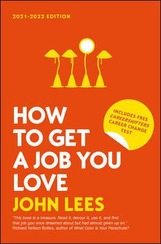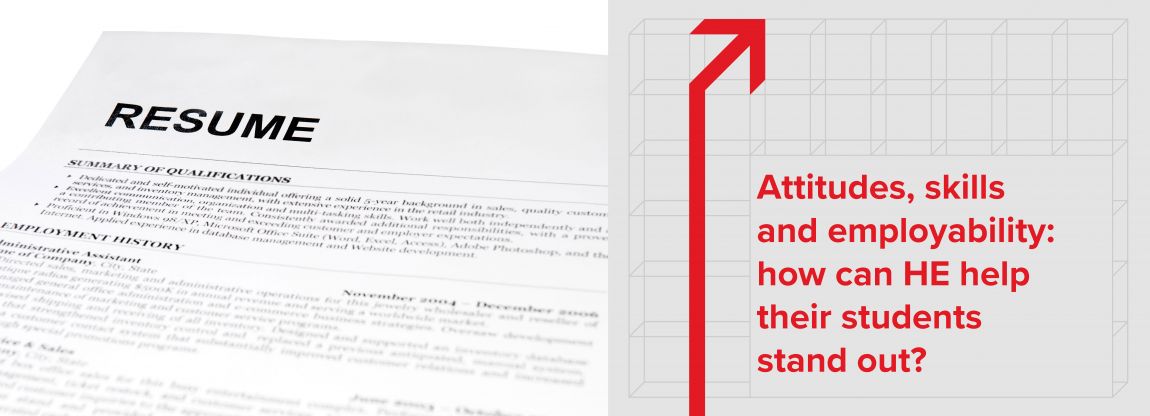Attitudes, skills and employability: how can HE help their students stand out?
Attitudes, skills and employability: how can HE help their students stand out?
Our Product Marketing Manager Ros Letellier speaks to John Lees, author of the bestselling book How to Get a Job You Love, about Higher Education and student employability.
Education and employability are, if not two sides of the same coin, then at the very least close relatives. Until very recent times, your level of education, the grade achieved, and indeed the very institution you received your higher education from, were perhaps the biggest factors in selection and recruitment. In fact, while there is a small and growing shift away from the idea of the degree as be-all and end-all, the zenith for employability, it remains a potent symbol of academic achievement, signifying not only what has been learned, but the student’s potential for learning. A good class degree from a good university is a reliable, rigorous and respectable indicator of a candidate’s calibre.
So that intersect between Higher Education and industry is a crucial one, yet there is a growing disconnect. The Common’s Education Select Committee’s Value for Money in Higher Education report released on the 5th of November 2018, revealed that over half of recent graduates were not working in graduate roles in 2017, concluding that “HE needs a sharper focus on graduate outcomes, the teaching of skills and improving access for those from disadvantaged backgrounds.” While a BBC news article on the same day stated that “too many students are left with debts for too little payback.”
This begs the question of whether Higher Education is adapting fast enough to prepare students for ‘new collar jobs’, to use the term coined by the World Economic Forum.


The WEF's paper New Vision for Education: Fostering Social and Emotional Learning through Technology, created in collaboration with the Boston Consulting Group, postulates that there is a growing global skills gap: “To thrive in the 21st century, students need more than traditional academic learning. They must be adept at collaboration, communication and problem-solving.” The report speaks of the need for Social and Emotional Learning (SEL) alongside the mastery of traditional skills and knowledge.


But is this so-called ‘skills gap’ really a new thing, and how serious is it in the UK? John Lees, author of bestselling book How to Get a Job You Love (now in its 11th edition), believes we must view it with caution. “Even in the 1970s, the Callaghan government made a big thing about higher education not providing the right skills. I think we have the same conversation every year.”
Indeed, Callaghan’s now famous Ruskin speech states: “I am concerned on my journeys to find complaints from industry that new recruits from the schools sometimes do not have the basic tools to do the job that is required."
"I have been concerned to find out that many of our best trained students who have completed the higher levels of education at university or polytechnic have no desire to join industry. Their preferences are to stay in academic life or to find their way into the civil service. There seems to be a need for more technological bias in science teaching that will lead towards practical applications in industry rather than towards academic studies.”
This very much resonates with the political conversation today which puts a heavy emphasis on STEM education as the answer to all our economic woes. Yet, from John’s interactions with employers in his mantle as careers expert and coach, what he’s hearing the most demand for is adaptability. “Organisations require staff who will either hit the ground running or will learn very, very fast. So candidates who often do well in the marketplace demonstrate the ability to pick up things really quickly. Which is a different mindset to saying you arrive prepared with the right skills; it's much more you arrive with a learning mindset and you adapt to change quickly. You learn stuff really fast, sometimes even in your own time."


"And then you learn all over again in 12-18 months - when technology changes, when the job changes, when the market changes. Fundamentally it may not be about skills at all, it may be about personality and adjustments in people's attitudes to learning.”
There’s also an idea that jobs of the future are going to require substantially different skills to the ones we need today. With statistics such as ‘an estimated 65% of school-aged children today will be working in jobs that currently don't exist’ being bandied about in the media, it’s easy for us to get whipped up into a vision of a sci-fi future that will leave many of us suffocating in a technological landscape that outstrips our understanding. But again, John takes a reasoned and more moderate view. “Most of them will be adaptations of existing skills. Often, they're the quite high-level interpersonal skills which are not new at all, they're just repackaged.”


John also believes that the best way for students to gain employability skills is by gaining tangible experience: “Graduates who are at the level where they are very market ready are there because they've had to do lots of things like internships and work experience, to get the evidence onto their CV. A growing number of courses give students exposure to real organisations. That could be a sandwich course but it's more likely to be a piece of work experience, or a visit, or a project, or a business school doing something in partnership with an organisation. Because employability is one of the metrics that drives higher education today, they are doing all kinds of interesting things to make connections with organisations.”
By giving students genuine experiences of the work environment, they are not only learning how their subject learning applies in a work context, they are crucially also gaining that understanding of workplace culture. “The biggest culture clash I see, and this is in business schools I work with, is not necessarily to do with skills, it is to do with understanding workplace culture. A good example of that is opportunities that are created for students to go in and meet people in organisations, and they don't turn up, or they turn up late. And even in the sessions that I do with business schools I notice students wander in half way through. So they're not really absorbing or thinking about the rigour of the work culture. Employers want people who are attentive to the needs of the organisation.”
Find out more about How to Get a Job You Love here.




